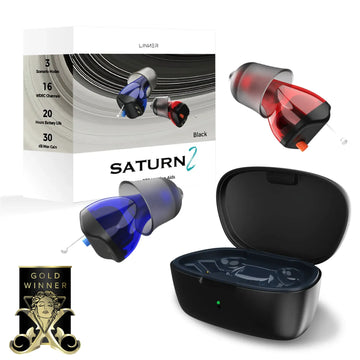
A Comprehensive Guide to Understanding the Different Types of Hearing Loss: Causes and Symptoms
Hearing loss is a multifaceted condition that affects millions worldwide, impacting an individual's ability to perceive sounds fully. Understanding the various types of hearing loss and their causes and identifying their symptoms is crucial for timely intervention and effective management.
As the auditory fabric of our society, hearing provides a fundamental channel to communicate and interact with the world around us.
Understanding the different types of hearing loss is crucial to identifying issues early and addressing them appropriately. In general, there are four primary categories: conductive, sensorineural, mixed, and central hearing loss.
The purpose of this guide is to help understand the different types of hearing loss, shedding light on their underlying causes and recognizable symptoms.
Types of Hearing Loss
1. Conductive Hearing Loss
Conductive hearing loss occurs when sound waves are unable to pass through the outer and middle ear to the inner ear. Causes can include ear infections, fluid accumulation, earwax buildup, or structural issues like a perforated eardrum.
2. Sensorineural Hearing Loss
Sensorineural hearing loss results from damage to the inner ear or auditory nerve. This type is often caused by aging (presbycusis), prolonged exposure to loud noises, genetic factors, or certain medications.
3. Mixed Hearing Loss
Mixed hearing loss is a combination of both conductive and sensorineural hearing loss. This can happen when an individual experiences issues in both the outer/middle ear and inner ear or auditory nerve.
4. Central Hearing Loss
Central hearing loss involves damage or dysfunction in the auditory nerve pathways or brain areas responsible for processing sound signals. Causes can include neurological conditions or injuries affecting the auditory pathways.
Causes of Hearing Loss
Conductive Hearing Loss Causes
- Ear Infections: Chronic or severe ear infections can lead to temporary or permanent hearing loss if left untreated.
- Earwax Buildup: Accumulation of earwax can block the ear canal, affecting sound conduction.
- Otosclerosis: Abnormal stiffness of the bone in the middle ear can restrict sound transmission.
Sensorineural Hearing Loss Causes
- Aging: Presbycusis is a natural age-related hearing loss due to changes in the inner ear.
- Noise Exposure: Prolonged exposure to loud noises damages delicate hair cells in the inner ear.
- Genetic Factors: Inherited genetic mutations can predispose individuals to hearing loss.
Mixed and Central Hearing Loss Causes
- Combination of Factors: Mixed hearing loss can result from a variety of causes affecting both the conductive and sensorineural pathways.
- Neurological Conditions: Central hearing loss may be associated with conditions like strokes or brain tumors affecting auditory pathways.
Recognizable Symptoms
Common Symptoms of Hearing Loss Include:
- Difficulty understanding speech, especially in noisy environments.
- Asking others to repeat themselves frequently.
- Turning up the volume excessively on electronic devices.
- Feeling isolated or withdrawn in social settings due to communication challenges.
- Tinnitus (ringing or buzzing in the ears).
Conclusion
Understanding the diverse types of hearing loss, their distinct causes, and identifiable symptoms is critical for early identification and intervention and seeking appropriate treatment and management.
As an integral part of our sensory experience, preserving our auditory capabilities should be a priority for each individual as we navigate through life.
It’s also worth acknowledging that advancements in medical technology have made it possible for people to resume almost normal lives despite their hearing challenges.
In today’s world, equipped with compelling scientific breakthroughs and evolving technologies like cochlear implants, digital hearing aids, and improved over-the-counter hearing devices, treating or managing hearing loss has become more effective.
Early detection through regular hearing screenings and prompt intervention can significantly improve outcomes and quality of life for individuals experiencing hearing loss.
References:
World Health Organization (WHO). (2020). Deafness and hearing loss. [Link](https://www.who.int/news-room/fact-sheets/detail/deafness-and-hearing-loss)
National Institute on Deafness and Other Communication Disorders (NIDCD). (2021). Types of Hearing Loss. [Link](https://www.nidcd.nih.gov/health/types-hearing-loss)
American Speech-Language-Hearing Association (ASHA). (n.d.). Causes of Hearing Loss in Adults. [Link](https://www.asha.org/public/hearing/causes-of-hearing-loss-in-adults/)
Mayo Clinic. (2021). Hearing Loss. [Link](https://www.mayoclinic.org/diseases-conditions/hearing-loss/symptoms-causes/syc-20373072)


![Linner Mercury Clarity OTC Hearing Aids [FSA & HSA Eligible] Linner](http://www.linnerlife.com/cdn/shop/files/Linner-Mercury-Clarity-OTC-Hearing-Aids-_FSA-_-HSA-Eligible_-Linner-110038953.webp?v=1725853434&width=360)

![Linner Mars OTC Hearing Aids [FSA & HSA Eligible] Linner](http://www.linnerlife.com/cdn/shop/files/Linner-Mars-OTC-Hearing-Aids-_FSA-_-HSA-Eligible_-Linner-110039213.webp?v=1725865495&width=360)
